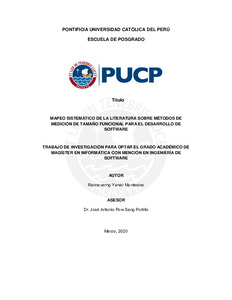| dc.contributor.advisor | Pow Sang Portillo, José Antonio | |
| dc.contributor.author | Yanac Montesino, Rannoverng | |
| dc.date.accessioned | 2020-08-26T19:39:29Z | |
| dc.date.available | 2020-08-26T19:39:29Z | |
| dc.date.created | 2020 | |
| dc.date.issued | 2020-08-26 | |
| dc.identifier.uri | http://hdl.handle.net/20.500.12404/16870 | |
| dc.description.abstract | En la actualidad el desarrollo de software continúa basándose en los requerimientos
funcionales del usuario por lo que es importante conocer el tamaño funcional del software. La
norma ISO/IEC 14143, define la medida del tamaño funcional (FSM, Functional Size
Measurement) para software, como la medida de funcionalidad que se desarrolla desde el
punto de vista de los usuarios, e independiente de cualquier aspecto técnico y de cualquier
forma de implementación. En el presente estudio se realiza un estudio de mapeo sistemático,
que incluye los métodos FSM, preguntas de investigación, estrategias de búsqueda basadas
en la técnica PICo, extracción de datos, selección y clasificación. En total se identificaron 196
artículos válidos para su revisión y clasificación de cada método FSM, que se usan sin cambiar
o modificar métodos FSM, que se usan con algunas propuestas de mejoras o cambios, con
el uso del método FSM en su forma de conversión, la automatización del método FSM, la
predicción o pronóstico de método FSM usando técnicas de aprendizaje automático con sus
respectivos datos históricos y por último conocer las propuestas de nuevos métodos FSM.
Los resultados mostrados nos permiten concluir que hasta la fecha hay un crecimiento relativo
en el uso de los métodos FSM para ser utilizadas en proyectos de desarrollo de software, y el
método FSM más utilizado es el IFPUG seguido del método COSMIC con enfoques
tradicionales y ágiles, se han revisado 196 artículos del 2014 hasta mayo 2019. | es_ES |
| dc.description.abstract | Currently, software development continues based on the user's functional requirements, so it
is important to know the functional size of the software. The ISO / IEC 14143 standard defines
the measure of functional size (FSM) for software, as the measure of functionality that is
developed from the point of view of users, and independent of any technical aspect and in any
way of implementation. In this study, a systematic mapping study is carried out, which includes
the FSM methods, research questions, search strategies based on the PICo technique, data
extraction, selection and classification. In total, 196 valid articles were identified for review and
classification of each FSM method, which are used without changing or modifying FSM
methods, which are used with some proposals for improvements or changes, with the use of
the FSM method in its conversion form, the automation of the FSM method, the prediction or
forecast of the FSM method using machine learning techniques with their respective historical
data and finally knowing the proposals of new FSM methods. The results shown allow us to
conclude that to date there is a relative growth in the use of the FSM methods to be used in
software development projects, and the most used FSM method is the IFPUG followed by the
COSMIC method with traditional and agile approaches, 196 articles from 2014 to May 2019
have been reviewed. | es_ES |
| dc.description.uri | Trabajo de investigación | es_ES |
| dc.language.iso | spa | es_ES |
| dc.publisher | Pontificia Universidad Católica del Perú | es_ES |
| dc.rights | info:eu-repo/semantics/closedAccess | es_ES |
| dc.subject | Algoritmos | es_ES |
| dc.subject | Programas para computadoras--Desarrollo | es_ES |
| dc.subject | Programas para computadoras--Evaluación | es_ES |
| dc.title | Mapeo sistemático de la literatura sobre métodos de medición de tamaño funcional para el desarrollo de software | es_ES |
| dc.type | info:eu-repo/semantics/masterThesis | es_ES |
| thesis.degree.name | Maestro en Informática con mención en Ingeniería de Software | es_ES |
| thesis.degree.level | Maestría | es_ES |
| thesis.degree.grantor | Pontificia Universidad Católica del Perú. Escuela de Posgrado | es_ES |
| thesis.degree.discipline | Informática con mención en Ingeniería de Software | es_ES |
| renati.advisor.dni | 21520576 | |
| renati.advisor.orcid | https://orcid.org/0000-0003-4001-8072 | es_ES |
| renati.discipline | 612357 | es_ES |
| renati.level | https://purl.org/pe-repo/renati/level#maestro | es_ES |
| renati.type | http://purl.org/pe-repo/renati/type#trabajoDeInvestigacion | es_ES |
| dc.publisher.country | PE | es_ES |
| dc.subject.ocde | https://purl.org/pe-repo/ocde/ford#1.02.00 | es_ES |





